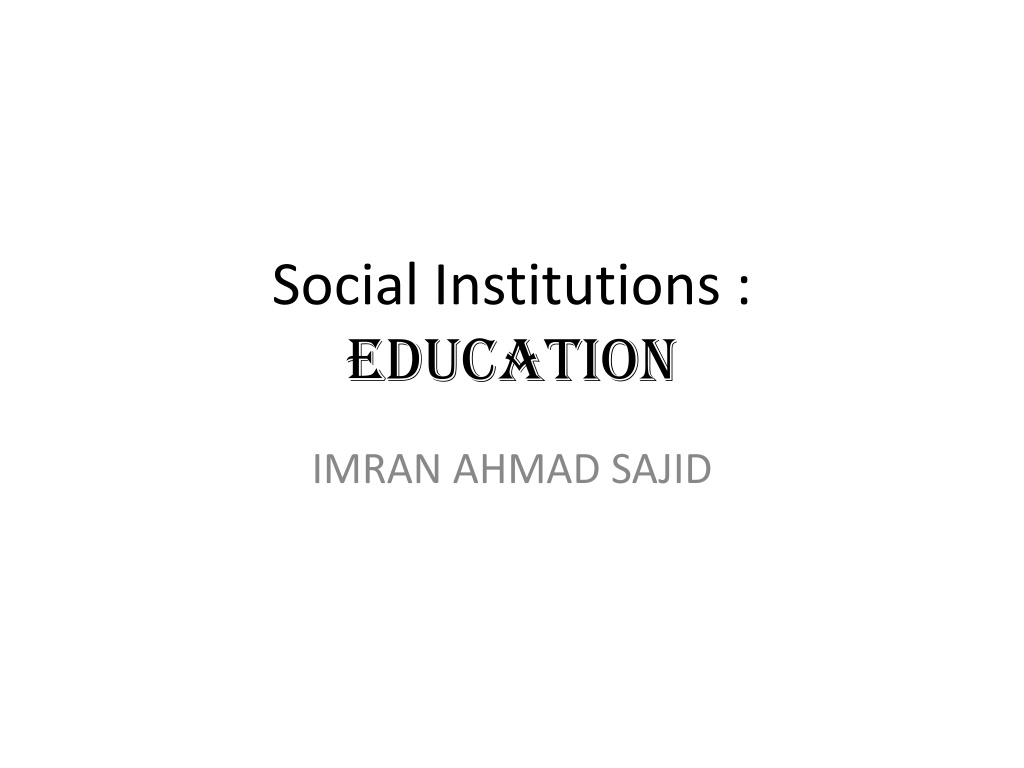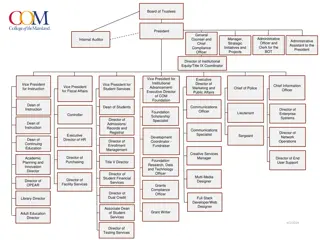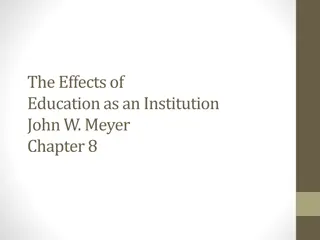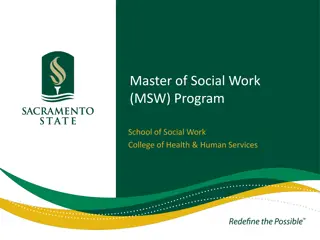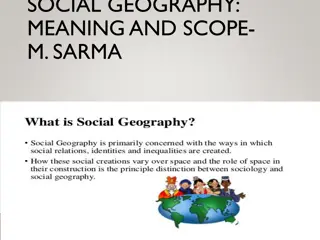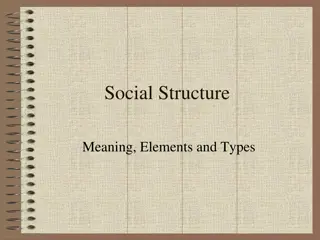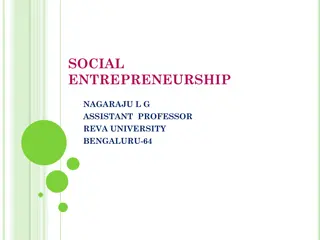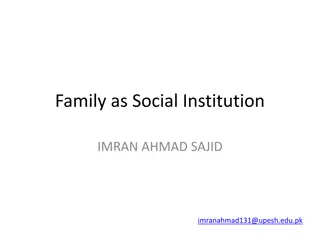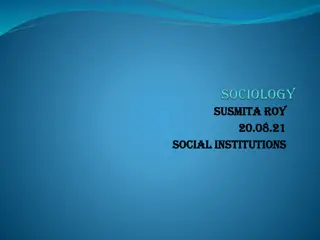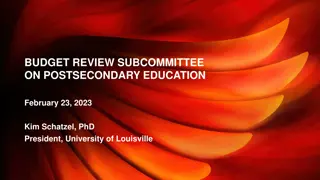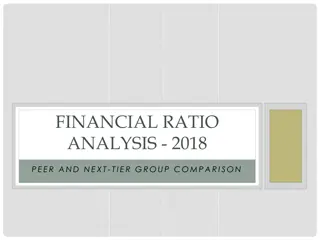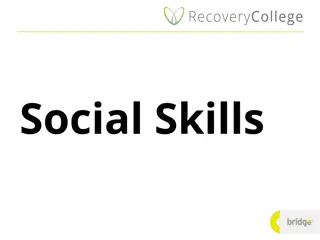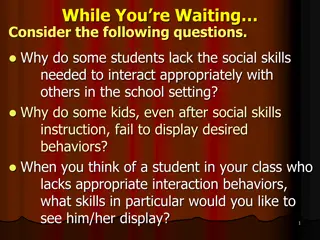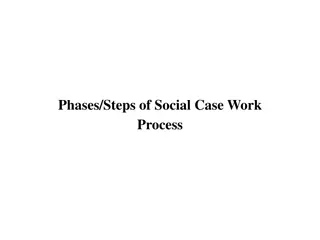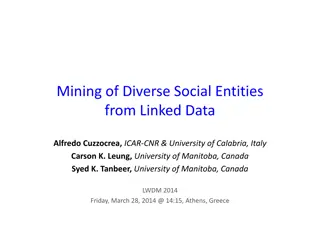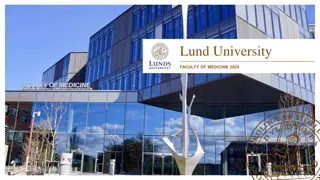Understanding the Social Institution of Education
Education is a vital social institution that goes beyond knowledge impartation, encompassing the development of habits and attitudes to navigate the future successfully. Various perspectives, from Durkheim to Plato, shed light on the purpose and significance of education in shaping individuals and society. Britannica Encyclopedia defines education as the transmission of societal values and knowledge. Schooling and teaching play essential roles in formal instruction, while the ultimate goal, as articulated by Aristotle, is to develop one's faculties to contemplate truth, goodness, and beauty for perfect happiness.
Download Presentation

Please find below an Image/Link to download the presentation.
The content on the website is provided AS IS for your information and personal use only. It may not be sold, licensed, or shared on other websites without obtaining consent from the author. Download presentation by click this link. If you encounter any issues during the download, it is possible that the publisher has removed the file from their server.
E N D
Presentation Transcript
Social Institutions : EDUCATION IMRAN AHMAD SAJID
Education . Latin educare bring up. The idea of education is not merely to impart knowledge to the pupil in some subjects but to develop in them those habits and attitudes with which they may successfully face the future.
Education John J. Macionis Education is the social institution through which society provides its members with important knowledge, including basic facts, job skills, and cultural norms and values.
Durkheim: Education is the socialization of the younger generation. WG Sumner Education is the attempt to transmit to the child the mores of the group, so that he can learn what conduct is approved and what disapproved how he ought to behave in all kinds of cases: what he ought to believe and reject .
Britannica Encyclopedia Education is the discipline that is concerned with methods of teaching and learning in schools or school-like environments as opposed to various non-formal and informal means of socialization Education can be thought of as the transmission of the values and accumulated knowledge of a society. In this sense, it is equivalent to what social scientists term socialization or enculturation
Schooling Schooling is the formal instruction under the direction of specially trained teachers.
Teaching Teaching, systematic presentation of facts, ideas, skills, and techniques to students
Purpose of Education Plato: the end of education is to develop in the body and in the soul (of the pupil) all the beauty and all the perfection of which they are capable. Aristotle: The aim of education is to develop man s faculties, especially, his mind, so that he may be able to enjoy the contemplation of the supreme truth, goodness and beauty in which perfect happiness essentially consists.
Eleanor Roosevelt --1930 article, Good Citizenship
Jonathan Cohen, cofounder and president of the National School Climate Center. the purpose of education is to support children in developing the skills, the knowledge, and the dispositions that will allow them to be responsible, contributing members of their community their democratically-informed community. Meaning, to be a good friend, to be a good mate, to be able to work, and to contribute to the well-being of the community."
Education: A Global Survey In much of the world, young people expect to spend most of their first 18 years in school. This was not the case a century ago when just a small elite had the privilege of attending school. Even today, most young people in poor countries receive only a few years of formal schooling.
Schooling in Pakistan In Pakistan, most poor families depend on earnings of children. Many children continue to work in factories weaving rug or making handcrafts up to sixty hours a week, which greatly limits their opportunities for schooling. Today, 91% children in Pakistan complete primary school most often in crowded schoolrooms where one teacher typically faces forty or more children. Likewise, in KP, one teacher faces 45-50 students in a primary school classroom. In contrast, a US primary school teacher faces average 30 students in a classroom. 60% go on to Secondary School, but very few enter college. Currently, 44% of Pakistan s people are not able to read and write.
Patriarchy also shapes Pakistani education. Pakistani parents are joyful at the birth of a boy because he will contribute income to the family. But there are economic costs to raising a girl: parents must provide a dowry (a gift of wealth to the groom s family), and after her marriage, a daughter s work benefits her husband s family. Therefore, many Pakistanis see less reason to invest in the schooling of girls. So only a limited population of girls reach secondary and higher education level. What do the girls do while the boys are in school?
Schooling in Japan Schooling has not always been part of the Japanese way of life. Before industrialization brought mandatory education in 1872, only a privileged few attended school. Today, Japan s education system is widely praised for producing some of the world s highest achievers. The early grades concentrate on transmitting Japanese traditions, especially a sense of obligation to family. Starting in their early teens, students take a series of difficult and highly competitive examinations. Their scores on these written tests, which are like NTS in Pakistan decide the future of all Japanese students. More men and women graduate from high school in Japan (95%) than in the US (87%). But competitive examinations allow just 48% of high school graduates compared to 70% in the US to enter college. Understandably, Japanese students (and their parents) take entrance examinations very seriously. About half attend cram schools : to prepare for exams, which means very late nights completing homework. Such hard work is one reason that Japanese students often nap in class-seen by teachers as the mark of a serious student.
Japanese schooling produce impressive results. In a number of fields, notably mathematics and science, Japanese students (who rank 4thin the world) outperform students in almost every other high income nation, including US (ranked in 26thplace).
Functions of Education Formal Education supports the operation and stability of society. How? Through following five (5) functions: 1. Socialization 2. Cultural Innovation 3. Social Integration 4. Social Placement 5. Latent Functions
1. Socialization Technologically simple societies look to families to teach skills and values and thus to transmit a way of life from one generation to the next. As societies gain more complex technology, they turn to trained teachers to develop and pass on the more specialized knowledge that adults will need to take their place in the workforce. In primary school, children learn language and basic mathematical skills. Secondary school builds on this foundation, and for many students, college allows further specialization. In addition, all schooling teaches cultural values and norms.
2. Cultural Innovation Faculty at colleges and universities create culture as well as pass it on to students. Research in the sciences, the social sciences, the humanities, and the fine arts leads to discovery and changes in our way of life. For example, medical research at major universities has helped increase life expectancy, just as research by sociologists and psychologists helps us learn how to enjoy life more so that we can take advantage of our longevity.
3. Social Integration* Schooling molds a diverse population into one society sharing norms and values. *Social integration refers to the principles by which individuals or actors are related to one another in a society; system integration refers to the relationships between parts of a society or social system.
4. Social Placement School identify talent that match instruction to ability. Schooling increases meritocracy* by rewarding talent and hard work regardless of social background and provides a path to upward social mobility. * system based on ability:
5. Latent Functions of Schooling 1. Child care 2. Marriage market 3. Establish networks that serve valuable career resource throughout life. 4. Economic function 5. Political function
